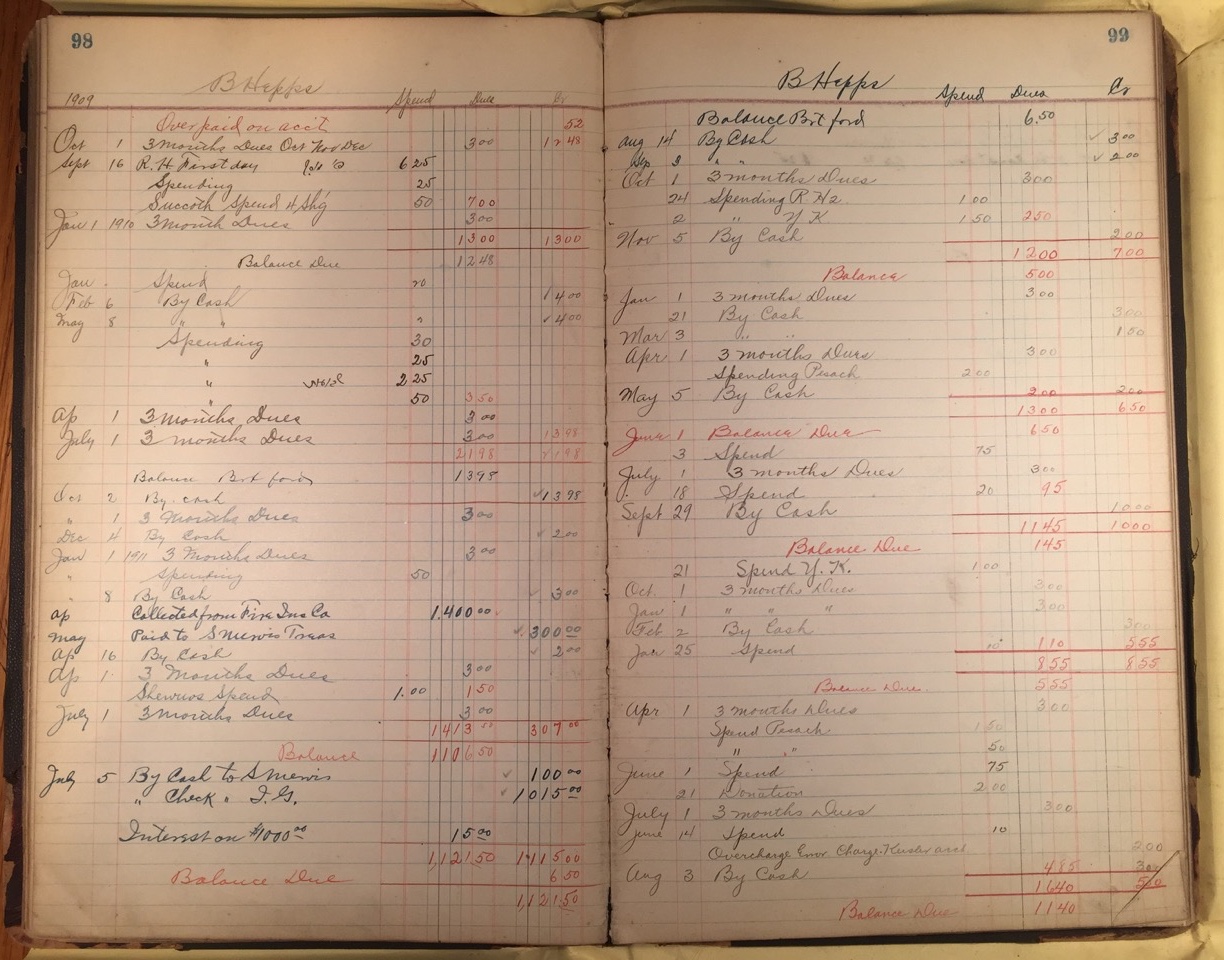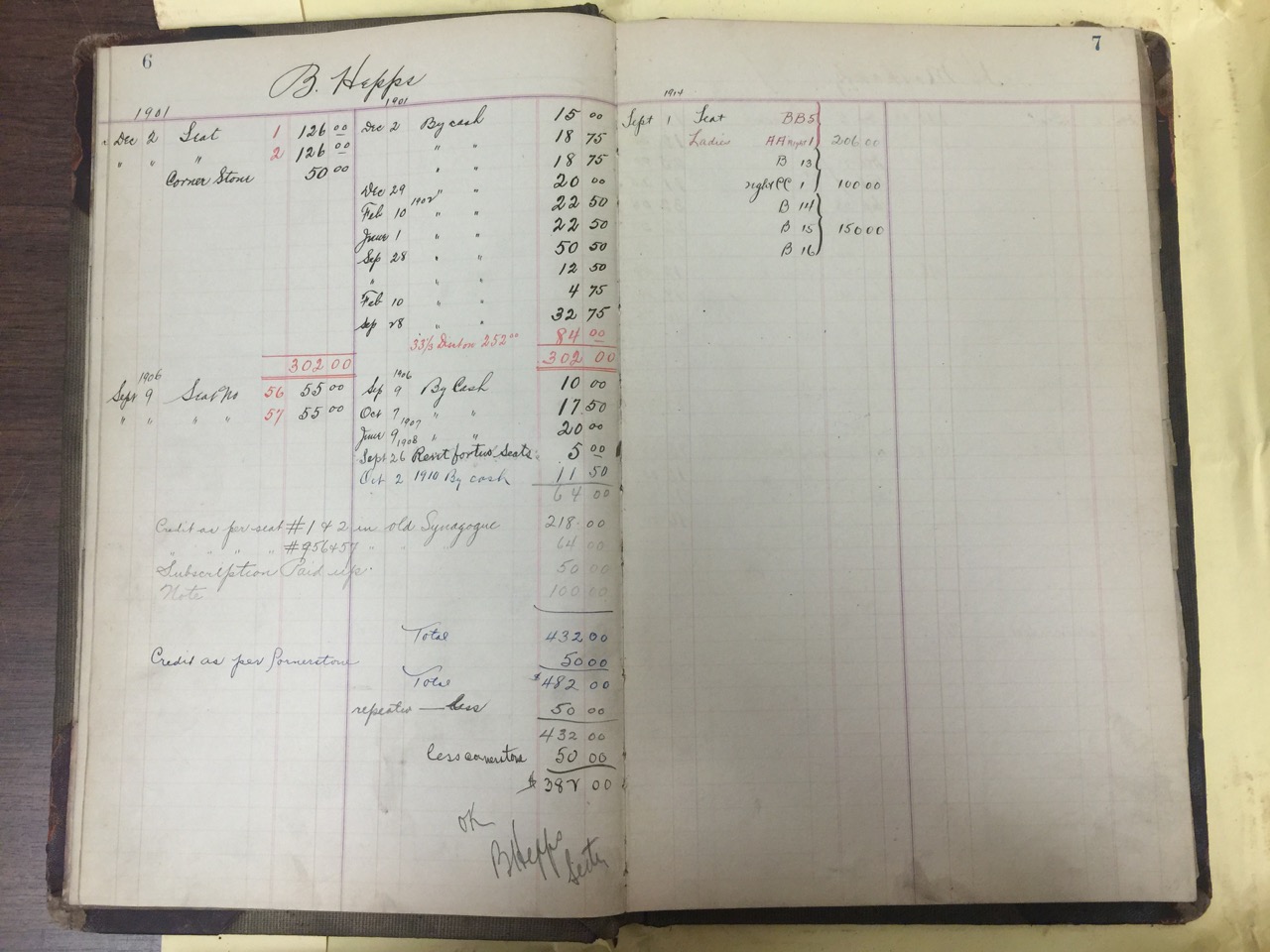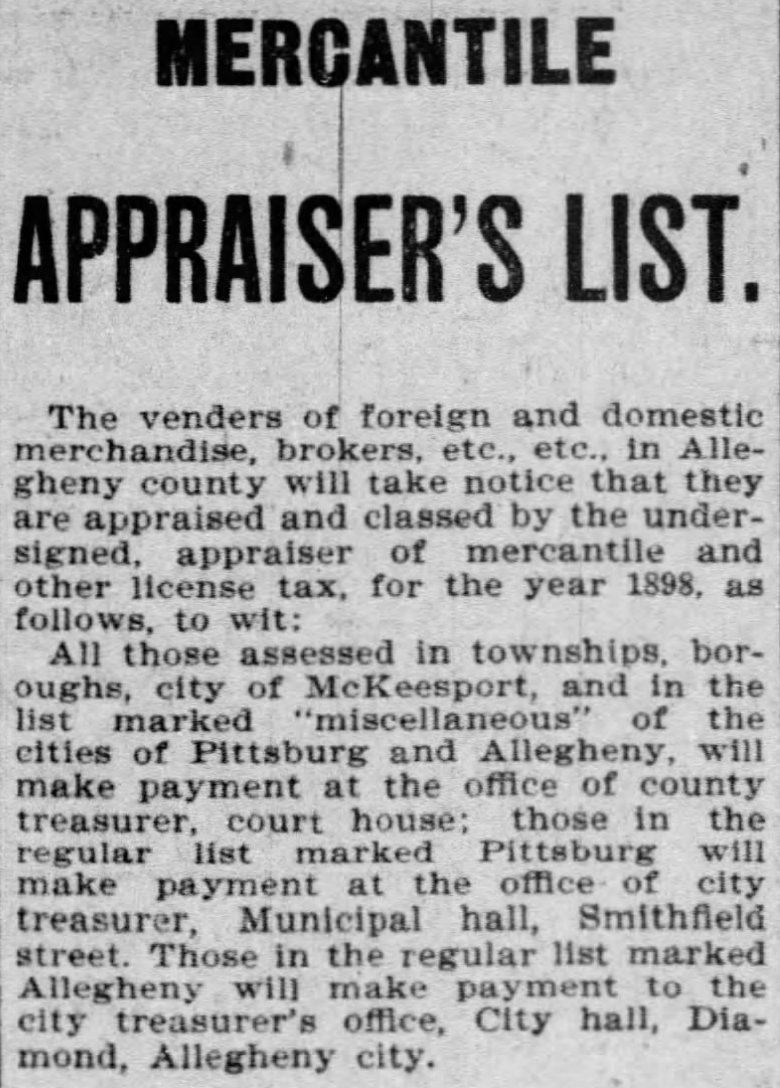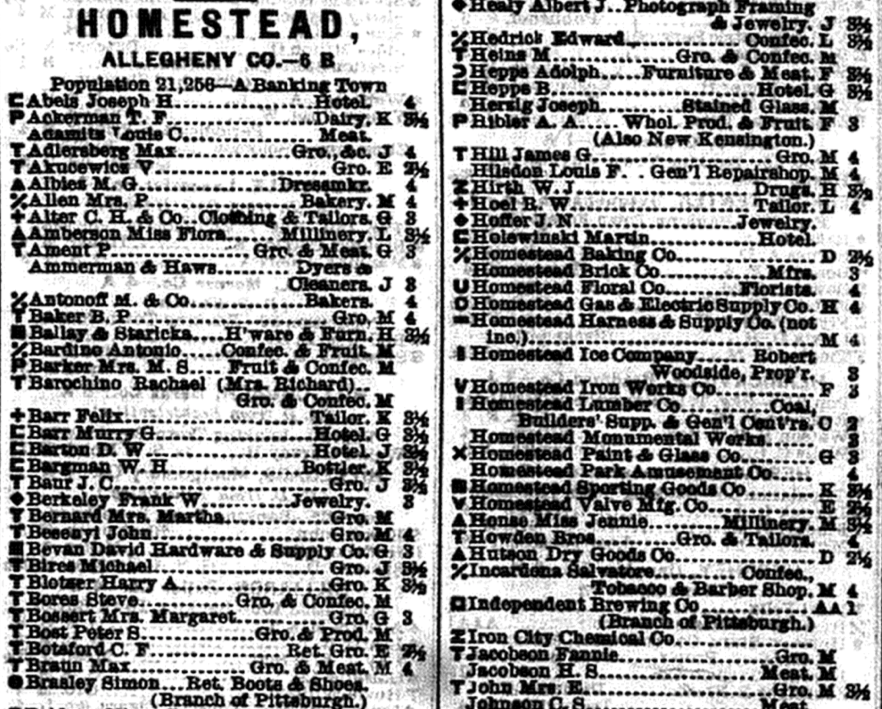Collections of Records
Filter collections
Directory (2)
Newspaper (1)
County (2)
Uncategorized (2)
Business directory (2)
Allegheny County Liquor Records
Description
This set includes three sets of liquor license records:
- Retail Liquor License Registers, 1902, 1906, 1908-1910
- Liquor Licenses, 1867-1907
- Applications for Retail Liquor Licenses, 1896-1908 (but all of the relevant records I found were actually for wholesale licenses)
Location of original records
These are in the Pennsylvania State Archives in Harrisburg. The online finding aids are hyperlinked.
What is posted here
Everything I found for liquor licenses and applications (though for the latter, what survives is very scant).
46 records County records Complete
Allegheny County Tax Records

Example record. Click to enlarge.
Homestead tax records survive for the years 1883-1885, 1887, 1890, 1892-1900, and then every 5 years thereafter through 1935. I reviewed the run selectively through 1935, though the 1930 volumes were out for conservation and therefore not obtainable when I did this research. I did not review the other relevant boroughs (Munhall, West Homestead, Hays, &c.).
County taxes during this period appear to be based on profession and property ownership, making this collection useful for tracking only some aspects of wealth accumulation.* It is certainly a much easier way to track real estate activity than researching at the county deeds office.
* For reference, the federal income tax was introduced in 1913.
Location of original records
Pennsylvania State Archives in Harrisburg, PA and University of Pittsburgh Archives.
What is posted here
Homestead Ward 2: 1893-1900, 1905, 1910. Homestead Wards 1 and 2: 1915, 1920, 1925, 1935.
417 records County records In progress
HHC Cash Book, 1902-1916
Description
This book lists all the income and expenses of the congregation from 1902 (when they began to use their synagogue building) and 1916 (when the book ran out of pages). These entries come only from the half of the book tabulating the shul's income. Through these entries, we can trace how the membership grew (including exactly when individuals joined), as well as how the overall Jewish community grew (through annual High Holiday ticket sales, which drew a much larger crowd than just members).
For context: Joining the shul required paying a proposal fee, initiation fee, and dues. These costs were beyond the reach of most new immigrants, who typically did not join when they arrived in the community. Single men also largely did not join until after they were married. I suspect there were many regular shul-goers who were not members.
This ledger book is the first of a series, but I have not transcribed the others, because after 1909 the shul's surviving record books include volumes organized by person, which require far less time to review to trace the comings and goings of individual members.
Location of original records
Box 4, Folder 4 in MSS #107 at the Rauh Jewish Archives.
What is posted here
~90% of the ~4,457 entries
4,089 records Synagogue records In progress
HHC Hebrew School Records, 1955-1967
Description
Individual cards per student indicate which years the student attended Hebrew school and how s/he performed. The cards often have some detail about the student's family.
Separately, students who were confirmed are tagged as such. This list, which spans 1914-1967 with many gaps, is incredibly scattershot, cobbled together from confirmation programs in Box 16, Folder 2 and newspapers articles.
Location of original records
Rauh Jewish Archives, MSS #107, Box 16
What is posted here
While all the cards are indexed here, the original cards have more detail than I've transcribed or posted here.
67 records Synagogue records Complete
HHC Ledger (plus notes), 1947-1969
Description
In December 1947 the synagogue switched to a very different kind of bookkeeping than it had used heretofore. Instead of maintaining a duplicate set of ledgers -- one with pages for individual members, the other with running totals of all income and expenses -- it consolidated into one giant (literally!) ledger with multiple lists per year of charges to members for things like dues, holidays, seats, donations, and Hebrew school.
It seems that this new methodology involved pre-assembling the lists on notebook paper and then copying them into the big ledger book. It appears that for some years only some of the lists were copied over, or none at all, so this set of records is taken from both the ledger book and the notebook paper.
Location of original records
The ledger book is part of MSS #107 at the Rauh Jewish Archives, but because it's such a large book, it's on the shelf. The notebook paper lists are in Box 6, Folders 1-4.
What is posted here
One member list per year, 1947-1969.
(Note: Due to the ~5 year gap between the previous set of records and these, because these records have just names with no identifying details or account status notes, because so many people even within this small community had the same names, and most especially because the late date puts us out to sea with no censuses or city directories to anchor us, it is extremely difficult to identify many of these people with confidence.)
2,827 records Synagogue records In progress
HHC Ledgers of Individual Accounts, 1909-1943

Example record. Click to enlarge.
This series of books contains entries for everyone who was a member of the synagogue, and select records for payments of non-members. For members the entries span one to three pages and include all financial transactions and payments. The information I've transcribed is a summary of much more detailed records. Ledgers of this format run through 1943. (Accounting records of a different format track the synagogue's members through 1969).
Location of original records
All are in MSS #107 at the Rauh Jewish Archives.
- 1909-1914: Box 1 (In this book, the first line of each person's entry says "Balance Brought Forward"… presumably from an earlier book that does not survive. :-( )
- 1914-1921: Box 1
- 1921-1928: Box 1
- 1928-1934: Box 2
- 1934-1943: Box 2
What is posted here
1909-1943, members only
865 records Synagogue records In progress
HHC Matzevot
Description
Photographs of the matzevot (headstones) in the Homestead Hebrew Cemetery. The photographs were taken on September 22, 2019. Stones unveiled after that day are not included.
What is posted here
Some stones are too old/damaged to be identified. Multiple photographs are included for stones where the front and back have different information; often this is the case for stones which have Hebrew on one side and English on the other. Very young children often did not receive stones, and their burial location is not identifiable via synagogue records.
859 records Synagogue records Complete
HHC Membership Notes from Meeting Minutes, 1940-1978
Description
Due to inconsistencies in the synagogue's accounting in the mid-1940s, there appears to be a dramatic fall-off in synagogue members that never actually happened. And after 1969, there are no financial records to document membership changes. By reading through meeting minutes from this period (acknowledging a significant gap 1951-1962), I've been able to fill in some missing data to get a true picture of how synagogue membership changed during these critical periods.
Location of original records
MSS #107, Box 8. Page numbers indicted in each record.
What is posted here
Extracted notes from synagogue meeting minutes that indicate when members joined or left the synagogue, 1940-1978 (gap 1951-1962). (Excluded newlyweds granted a year of free membership in the 60s and 70s. This doesn't appear to have ever converted into a dues-paying member.)
156 records Synagogue records Complete
HHC Miscellaneous Records
Description
Miscellaneous synagogue records that did not fit elsewhere. Sources indicated with each record.
12 records Synagogue records In progress
HHC Officers
Description
A list of every person who had an elected position in the congregation or sisterhood.
For the congregation, elections were held more frequently in the early years, but were annual for most of the congregation's history. A couple shifts happened over time: in 1924 they re-organized to form a Board of Directors, and in 1934 they shifted the calendar year from September-August (to correspond with the Jewish holidays) to January-December.
The sisterhood appears to have held elections annually at the beginning of the year, though far fewer records survive to document their procedures.
Disagreements between the different sources are indicated informally using parentheses or notes.
Location of original records
This data comes mostly from the synagogue records in the Rauh Jewish Archives.
The congregational data is assembled primarily from the Box 9, Folder 6 "analog spreadsheet"; the chronologies in Box 4, Folder 1, pp. 158- and Box 4, Folder 2, pp. 67+; and meeting minutes. In a few cases in the 50s when none of the above is available, event programs filled in some gaps. The complete list runs through early 1978, when the traditional officers + board structure was replaced by a management committee comprised of active men and women. Other than the initial list of members, no records exist to trace this group.
Currently the sisterhood data is assembled solely from the one ledger that survives in Box 9, Folder 7.
What is posted here
Congregation: 1894-1978; Sisterhood: 1945-1956
Future work: Some sisterhood gaps can be filled in from newspaper articles and congregational meeting minutes, but I haven't done this work yet. The same may be true for some of the congregational gaps. Both groups had committees whose members needs to be added here. The Chevra Kadisha officers also ought to be added here for completeness.
918 records Synagogue records In progress
HHC Seat Book, 1901-1914

Example record. Click to enlarge.
This ledger book organizes seat-related transactions in the first synagogue—when people bought and sold seats, how much they paid and when, and even seat trading amongst members. Not all members owned seats, due to the cost, so the date of purchase may indicate when the purchaser attained a level of economic stability. The date of sale is often correlated with when the seller left Homestead. The information provided here is only a summary of what appears in the actual ledger book.
Interestingly, it is the only such book that survives, though seat-related transactions continued for most of the rest of the synagogue's history. Other than this period, it is extremely difficult to figure out who owned seats and when.
Location of original records
MSS #107, Box 2. Page numbers indicted in each record.
76 records Synagogue records Complete
HHC War Honor Rolls
Description
The Jewish organizations of Homestead created three plaques to honor the boys from their community who saw service during WWI and WWII and erected a monument in their cemetery to those boys who died fighting.
- Homestead Jewish Soldiers and Sailors Welfare League (for WWI): Dedicated September 21, 1919
- Young Men's Hebrew Association of Homestead (for WWI): Dedicated February 22, 1920
- WWII Honor Roll: Dedicated April 4, 1948
- War Memorial in cemetery: Dedicated May 30, 1956
Location of original records
Today all the plaques are located in the Homestead Hebrew Chapel in Congregation Beth Shalom in Pittsburgh; pictures online here. The War Memorial remains at the front of the cemetery; pictures online here.
What is posted here
Names of boys who served in WWI and WWII, taken from the synagogue's three honor roll plaques (currently located in Beth Shalom) and war memorial in the cemetery.
224 records Synagogue records Complete
HHC Yahrzeit Plaques
Description
It is a Jewish tradition to commemorate the passing of loved ones on a dedicated memorial wall in the synagogue, often within the sanctuary itself, with nameplates inscribed with the English and Hebrew names and death dates of the departed. Beside each plaque is a memorial light, which is lit annually on the person's yahrzeit (anniversary of his death) and on occasions when yizkor (the memorial service) is recited.
The Homestead synagogue maintained yahrzeit plaques starting in 1943—49 years after the congregation was founded. Some plaques pre-date this year, including for loved ones who never set foot in America, but most are for members of the community who died after 1943.
Prior the yahrzeit plaques, a marble table was maintained in the ohel at the cemetery. Names of loved ones were periodically inscribed; the last one was added in the early 60s.
Location of original records
Today all the plaques are located in the Homestead Hebrew Chapel in Congregation Beth Shalom in Pittsburgh; pictures online here. The marble tablet in the ohel is visible here.
What is posted here
Plaques continue to be added; two were added in spring 2018 for people who passed in 2017.
303 records Synagogue records Complete
Homestead Directories
Description
From 1890 to 1945 Homestead published city directories every 1-6 years (most often every 2-3). For the earliest years of the community, they are about the only record to document residents of the town since the 1890 census was destroyed in a fire, and the 1900 census was badly done. That said, even these early city directories knowingly excluded foreign residents. In later years the directories list more people than the census, and they also provide much insight into the town's businesses and businessmen.
Location of original records
All the Homestead city directories 1890-1945 are fully searchable online at DonsList.net.
What is posted here
1890-1945
7,519 records Directory records Complete
Mercantile Appraiser' List

Example record. Click to enlarge.
The Mercantile Appraiser was an Allegheny County government employee who "appraised and classed" all the county's "vendors of foreign and domestic merchandise, brokers, etc. etc." to determine what "mercantile and other license tax" each merchant was required to pay to do business for that calendar year (The Pittsburg Post, May 15, 1899, p. 3). The printed list of merchants and tax due gave merchants a chance to challenge their assessments. The list was printed 4 times in 3 different papers per county. (More info here.) This function began in 1816 and switched to state control in 1919, after which these lists no longer appear in newspapers.
Location of original records
In digitized Pittsburgh newspapers.
What is posted here
Reviewed for Homestead starting in 1877. Could not find for 1883, 1884, 1894. Posted through 1919.
1,699 records Business directory records Complete
Miscellaneous Records
Description
Miscellaneous records from various sources (indicated with each record). They include:
- Genealogical records like marriage returns and naturalizations that are not online
- General archival material like orphanage records and court records
- Event programs from the Carnegie Library Music Hall, and
- Book excerpts that did not fit elsewhere
51 records Uncategorized records In progress
Newspaper Articles
Description
This collection comprises three sets of newspaper articles:
- The Homestead town newspaper: The coverage of Homestead's Jewish community in the town's paper ebbs and flows over time. When the town was smaller, more individual members' personal and professional happens received greater coverage than in later periods when the paper lost its folksy edge. In all periods, the more established people—store-keepers, property owners, society officers, &c.—received much more coverage those who were of a more humble station—unless, of course, something sensational happened.
- The Pittsburgh Jewish newspapers: Coverage of the Homestead Jewish community begins with the dedication of the first shul in 1902 and grows especially in the 1910s when the paper made a special point of covering the small towns in Western PA.
- Various Pittsburgh newspapers
Location of original records
- All of the Homestead newspapers from 1881-1970s are available on microfilm in the main Carnegie Library branch in the Oakland neighborhood of Pittsburgh and other places. (More details here.) This microfilm has not been digitized, let alone indexed, so it is not searchable.
- The Pittsburgh Jewish Newspaper Project has the full run of Pittsburgh's Jewish newspapers, which include the Criterion, American Jewish Outlook, Y- & JCC-sponsored newsletters, and the Chronicle.
- The Post-Gazette archive of historical Pittsburgh papers has the full run of these papers. I have not reviewed them in any systematic way; only a small number of these articles are posted here.
What is posted here
- Homestead newspapers through 1910 (all articles concerning Jewish residents or the Jewish community). The main Homestead Hebrews website has them organized by date through 1920.
- Pittsburgh Jewish newspapers through 1999 (all articles mentioning Homestead, Munhall, West Homestead, Homeville, Lincoln Place, Whitaker, West Mifflin, or Mifflin Township (Hays ought to be included here, but it's not practical to search such a common name)). Please note that this limited search means there are many more relevant articles not included in this database—residents of these places are not always listed with their town, and Homesteaders who move to Pittsburgh and disaffiliate with Homestead institutions then disappear from this collection, though they still appear in the paper.
8,243 records Newspaper records In progress
Oral Histories
Description
In the 1960s-1980s, the Pittsburgh Section of the National Council of Jewish Women undertook an expansive oral history project covering hundreds of individuals. I selected for this database 7 interviews that mentioned Homestead. (Full transcriptions are not available, so potentially there are more relevant records, and I excluded a couple oral histories whose mentions of Homestead weren't significant.)
In 1993-4 after the Homestead synagogue closed, the last members of the congregation helped the Rauh Jewish Archives take oral histories of 29 surviving members of the congregation. I added an additional oral history taken in 2013 of a longtime Homestead merchant.
Location of original records
The oral histories are housed either at the Heinz History Center or the University of Pittsburgh Archive Service Center. Most are online here or here.
37 records Uncategorized records Complete
R.G. Dun & Co. Merchant Ratings

Example record. Click to enlarge.
The R.G. Dun & Co. Merchants Ratings are a little-known collection of records listing the merchants in every town in the United States, no matter how large or small, along with the nature and credit-worthiness of their businesses. Published quarterly, they provide extremely granular data for the comings and goings and advancement of the Jewish merchants of Homestead, who comprised a large percentage of the overage Jewish community. More about these records here.
When I first viewed these records, they were only partially available in person at the Library of Congress and at the Baker Library at Harvard Business School (Baker has volumes from the 1890s* that the LOC does not). Now all the Library of Congress records are digitized on their website through 1924, and they have physical volumes continuing through 1966.
The ratings keys are posted here.
* Even with the Baker volumes from the 1890s, there is a gap 1894-1897. To fill this gap, I consulted volumes from Dun's competitor, Bradstreet, covering these years, although unfortunately Bradstreet has its own 1890s gaps. These volumes are only available on microfilm at the LOC.
Location of original records
The Library of Congress has a mix of physical books and microfilm; however, records before 1925 are now digitized. Consult this finding aid for more information. The Baker Library at HBS has some physical books as well.
What is posted here
Dun: 1880-1924 for Homestead, Munhall, and nearby boroughs. There are some missing volumes, particularly in the mid-1890s. Bradstreet: Homestead 1886-1896, 1899 only.
9,239 records Business directory records In progress
U.S. Census, Homestead District
Description
In the United States, a country-wide census is taken every 10 years. The census records on this site cover Jewish people recorded in the censuses for Homestead, West Homestead, Munhall, Hays, Whitaker, and Mifflin Township.
What is posted here
1900-50.
(There was no Homestead in 1870, there were no Jews in Homestead in 1880, the 1890 census was destroyed in a fire, and the censuses after 1950 are not yet publicly available.